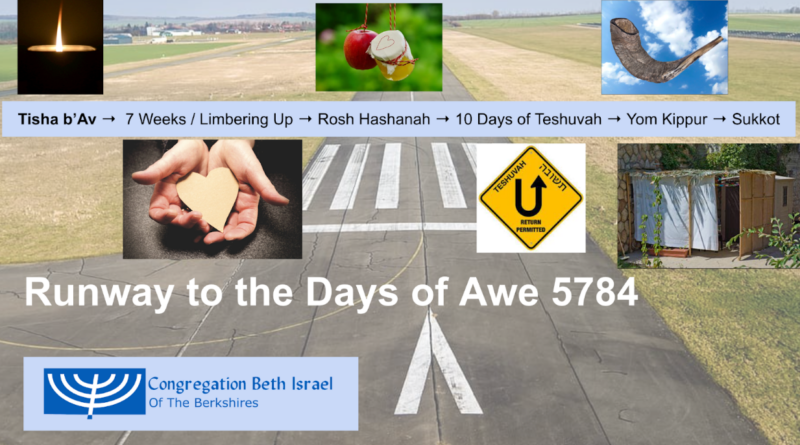July is upon us. All winter long I anticipate summer’s long daylight: the luscious green curves of our hillsides, how the pollinator garden behind the synagogue becomes a riot of color and leaf. And we’re here! We made it! This place where we are blessed to live is beautiful in all seasons, but this is the season I love the most. And… spiritual life never stands still. The wheel is always already turning toward the holidays to come.
Most of us may not really think much about Tisha b’Av, or maybe we’re not even entirely sure what it is. The name means “the 9th of (the month of) Av” — it’s just a date. But it’s the date when tradition teaches Babylon destroyed the First Temple in 586 BCE, and Rome destroyed the second one in 70 CE. Against all odds, it’s the date of many other communal traumas, too, like the beginning of the deportation from the Warsaw Ghetto.
Why is this an important day? For two reasons. One is that an authentic human life includes both rejoicing and mourning, and this is our tradition’s date for experiencing loss together. The other is that 9 Av launches a season of spiritual limbering-up — stretching the (metaphysical) muscles of our hearts as we prepare for the holidays. Our high holidays will be deeper, higher, and richer if we take advantage of this.
The first step of spiritual limbering-up is opening our hearts, and the primary tools we’ll use to open our hearts at Tisha b’Av are poetry and music — including music offered by our community choir, which has been rehearsing regularly all year. Music and poetry can reach us in deep ways. They can touch us and move us and open us up. They are powerful spiritual tools for opening our hearts and our selves to change.
Tradition teaches that on Tisha b’Av, the messiah will be born, a seed of hope on our day of greatest sorrow. That always makes me think of the Greek myth about Pandora’s box: filled with war and sickness and grief, her box of horrors also contained hope. I think both Jewish tradition and Hellenistic tradition are touching on the same deep truth: we find hope not despite what’s broken, but precisely in our brokenness.
Avoiding what’s broken, or numbing ourselves to the brokenness, or putting a band-aid atop the brokenness so we can pretend it isn’t there — none of that is spiritually healthy. Maybe the fall of the Temples seems long ago and far away (it is). But antisemitism is still going strong. There are still people who hate us. Not to mention, the holy Temple of our planet is burning. It’s honest and authentic to feel grief in the face of those things.
Our tradition teaches us not to marinate in grief but to move through it. We breathe it in together, and we breathe it out together. And then we plant the seeds of hope, and find something we can do to build toward better. That’s how we start readying ourselves for the Days of Awe: feeling everything there is to feel, and limbering up our hearts for the journey. Join us for Tisha b’Av — this year observed at CBI at 8pm on July 26.
May the music and the poetry of that deep day open our hearts to what’s broken — and may the teshuvah journey that flows from that galvanize us to bring repair.
Blessings to all,
— Rabbi Rachel






